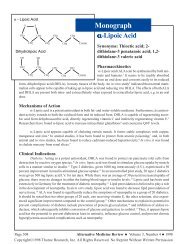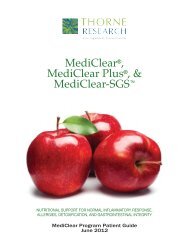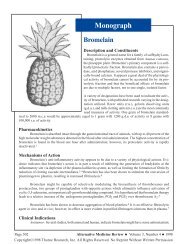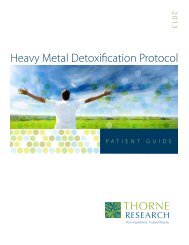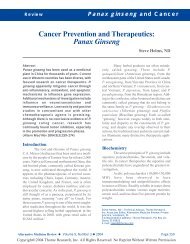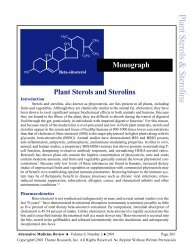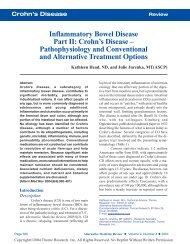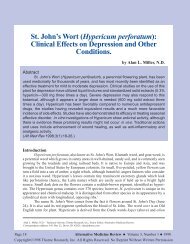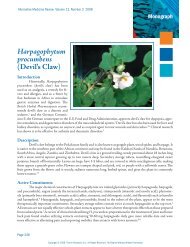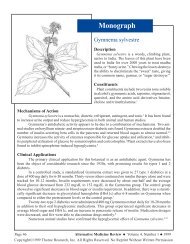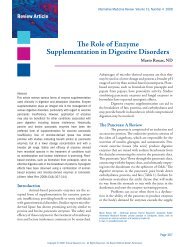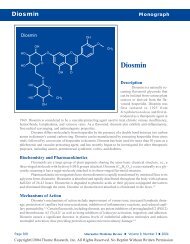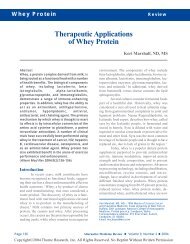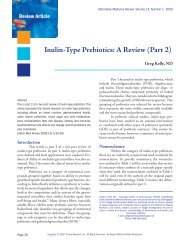Plantago ovata (Psyllium) - Thorne Research
Plantago ovata (Psyllium) - Thorne Research
Plantago ovata (Psyllium) - Thorne Research
Create successful ePaper yourself
Turn your PDF publications into a flip-book with our unique Google optimized e-Paper software.
<strong>Plantago</strong> <strong>ovata</strong> (<strong>Psyllium</strong>) Monograph<br />
cholestyramine. 6 In animals fed a high-fat diet,<br />
psyllium increased the activity of cholesterol 7<br />
alpha-hydroxylase and HMG-CoA reductase. 7<br />
This animal study also noted both pectin and psyllium<br />
reduced Apo B secretion and that LDL catabolic<br />
rates were 100-percent faster in animals fed<br />
psyllium. In a human study, psyllium lowered LDL<br />
cholesterol, decreased cholesterol absorption, and<br />
increased the fractional turnover of both chenodeoxycholic<br />
and cholic acids. 8 The authors’ conclusion<br />
was that psyllium lowered LDL cholesterol<br />
primarily via stimulation of bile acid synthesis.<br />
Further research might show this action to<br />
be through the stimulation of cholesterol 7 alphahydroxylase<br />
in humans as well.<br />
Clinical Indications<br />
Constipation<br />
The effectiveness of fiber, and psyllium<br />
in particular, on constipation depends on the main<br />
cause of the constipation. In a study of 149 patients<br />
with chronic constipation, the consumption<br />
of 15-30 grams daily of a psyllium seed preparation<br />
provided bowel relief in 85 percent of participants<br />
who had no known pathological cause<br />
for their constipation. Only 20 percent of individuals<br />
with slow transit responded to psyllium. A<br />
slightly greater percentage (37%) of those with<br />
disorders of defecation – including rectocele, internal<br />
prolapse, anismus, and rectal hyposensitivity<br />
– found improvement. 9<br />
Fecal Incontinence<br />
Because of its ability to retain water, psyllium<br />
has also been shown to benefit individuals<br />
with fecal incontinence from liquid stools or diarrhea.<br />
A placebo-controlled trial of persons with<br />
liquid stool fecal incontinence was performed in<br />
which supplementation with both gum arabic and<br />
psyllium showed approximately a 50-percent decrease<br />
in the occurrence of incontinent stools. The<br />
psyllium group had the highest water-holding capacity<br />
of water-insoluble solids and total waterholding<br />
capacity of the stool. 10<br />
Hemorrhoids<br />
With the known benefit of psyllium for<br />
both constipation and loose stools, it is not surprising<br />
it would also be of benefit for hemorrhoids.<br />
Fifty persons with internal bleeding hemorrhoids<br />
were given either a placebo of B vitamins or 11.6<br />
grams of Metamucil ® daily for 40 days. Individuals<br />
in the psyllium group had significant improvement<br />
in reduction of bleeding and a dramatic reduction<br />
of congested hemorrhoidal cushions.<br />
Bleeding on contact stopped after treatment in the<br />
psyllium group, while those in the control group<br />
experienced no difference. 11 It also appears psyllium<br />
treatment for this problem must be done for<br />
a minimum of one month, as a study of 30-day<br />
fiber supplementation failed to show improvement;<br />
12 whereas, when taken for 40 days significant<br />
improvement was noted. 13<br />
Ulcerative Colitis<br />
In an open label, randomized, multi-center<br />
trial of persons with ulcerative colitis, psyllium<br />
seed supplementation (10 grams twice daily)<br />
was as effective as mesalamine in maintaining<br />
remission. 14 This effect may likely be due to increased<br />
levels of butyric acid with psyllium<br />
supplementation.<br />
Appetite<br />
<strong>Psyllium</strong> may also have an effect on appetite.<br />
A triple-blind study on 17 women looked<br />
at the effect of taking 20 grams of psyllium seed<br />
three hours pre-meal and again immediately postmeal<br />
during three 3-day study periods. The subjects<br />
reported significantly increased feelings of<br />
fullness one hour after meals with the psyllium,<br />
and exhibited a significantly lower fat intake with<br />
those meals. 15<br />
Hyperlipidemia<br />
<strong>Psyllium</strong> has been shown to reduce total<br />
cholesterol and LDL cholesterol in animals 16-18 and<br />
in humans. Sprecher et al demonstrated a 3.5-percent<br />
reduction in total cholesterol and a 5.1-percent<br />
reduction in LDL levels after consuming 5.1<br />
grams of psyllium husk twice daily for eight<br />
weeks. 19 Another study began with individuals on<br />
Page 156 Alternative Medicine Review ◆ Volume 7, Number 2 ◆ 2002<br />
Copyright©2002 <strong>Thorne</strong> <strong>Research</strong>, Inc. All Rights Reserved. No Reprint Without Written Permission



